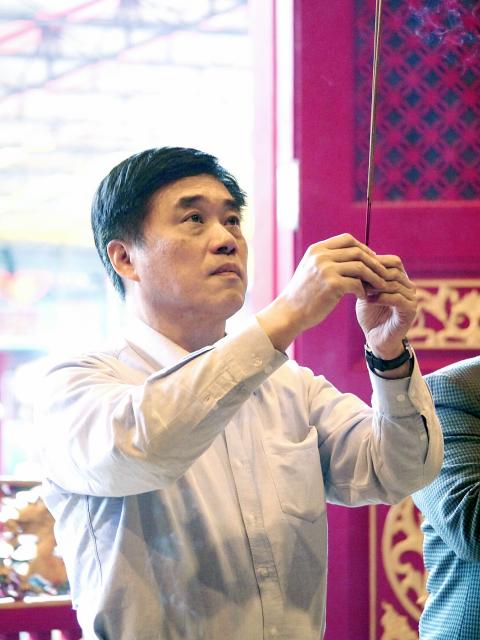Chinese Nationalist Party (KMT) Vice Chairman Hau Lung-bin (郝龍斌) yesterday said his bid for KMT chairperson would gain support from local and waishengren (外省人) factions, allowing him to unite the party, as he is less inclined to take part in politicking.
Waishengren refers to people who fled to Taiwan with the KMT in 1949 after its defeat in the Chinese Civil War.
He had intended to step down as vice party chairman to run in the May 20 race, but was convinced by fellow KMT Vice Chairman Jason Hu (胡志強) not to, Hau said in a radio interview, adding that part of his bid is to show that candidates could run for party chairperson and maintain cordial relations with other KMT members.

Photo: Chien Hui-ju, Taipei Times
The campaign has just started and everything is up in the air, Hau said, adding that should he find his bid failing, he would resign as vice chairman.
Hau said his campaign would be better than his rivals’.
KMT Chairwoman Hung Hsiu-chu (洪秀柱) “should fare worse than I” in the campaign, Hau said, adding that Hung could improve her party administration capabilities.
He said that former vice president Wu Den-yih (吳敦義) had party administration experience, as well as governmental administrative experience, but the 68-year-old’s age was not in his favor and he lacked support from the Huang Fu-hsing (黃復興) military veterans’ branch.
The Huang Fu-hsing is the party’s only special branch. Established in 1956 according to an initiative by then-president Chiang Ching-kuo (蔣經國) to protect the interests of veterans and to ensure that retired military personnel supported KMT policies, the branch holds considerable influence within the KMT.
Hau, the son of former premier Hau Pei-tsun (郝柏村), said that he has a deep connection with the Huang Fu-hsing branch and its members accepted him.
Hau said he had the support of KMT members from central and southern Taiwan after interacting with them over a referendum to maintain an import ban on food from five Japanese prefectures.
He would not run for president in 2020 if his chairperson bid is successful, Hau said, adding that he would ask Hon Hai Precision Industry Co chairman Terry Gou (郭台銘) to be the party’s presidential candidate in such a scenario.
A party chairperson should help presidential candidates, so staking a claim to represent the party in the 2020 race would not be conducive to party solidarity and would interfere with the chairperson’s role, Hau said.
Hau said that Gou had the best chance of being elected president in 2020.
At an event in Yilan County later yesterday, Hau said his assessment was based on pan-blue support for Gou over other party members.
The most important job for a party chairperson is to be impartial and to nominate the best candidate to run for president, Hau said.
The party will focus on winning local government elections next year and from there select the best candidate for the presidential race, he said.

Trips for more than 100,000 international and domestic air travelers could be disrupted as China launches a military exercise around Taiwan today, Taiwan’s Civil Aviation Administration (CAA) said yesterday. The exercise could affect nearly 900 flights scheduled to enter the Taipei Flight Information Region (FIR) during the exercise window, it added. A notice issued by the Chinese Civil Aviation Administration showed there would be seven temporary zones around the Taiwan Strait which would be used for live-fire exercises, lasting from 8am to 6pm today. All aircraft are prohibited from entering during exercise, it says. Taipei FIR has 14 international air routes and

Taiwan lacks effective and cost-efficient armaments to intercept rockets, making the planned “T-Dome” interception system necessary, two experts said on Tuesday. The concerns were raised after China’s military fired two waves of rockets during live-fire drills around Taiwan on Tuesday, part of two-day exercises code-named “Justice Mission 2025.” The first wave involved 17 rockets launched at 9am from Pingtan in China’s Fujian Province, according to Lieutenant General Hsieh Jih-sheng (謝日升) of the Office of the Deputy Chief of the General Staff for Intelligence at the Ministry of National Defense. Those rockets landed 70 nautical miles (129.6km) northeast of Keelung without flying over Taiwan,

City buses in Taipei and New Taipei City, as well as the Taipei MRT, would on Saturday begin accepting QR code payments from five electronic payment providers, the Taipei Department of Transportation said yesterday. The new option would allow passengers to use the “transportation QR code” feature from EasyWallet, iPass Money, iCash Pay, Jkopay or PXPay Plus. Passengers should open their preferred electronic payment app, select the “transportation code” — not the regular payment code — unlock it, and scan the code at ticket readers or gates, General Planning Division Director-General Liu Kuo-chu (劉國著) said. People should move through the

The Ministry of National Defense (MND) today released images of the military tracking China’s People's Liberation Army (PLA) movements during the latest round of Chinese drills around Taiwan. The PLA began "Justice Mission 2025" drills today, carrying out live-fire drills, simulated strikes on land and maritime targets, and exercises to blockade the nation's main ports. The exercises are to continue tomorrow, with the PLA announcing sea and air space restrictions for five zones around Taiwan for 10 hours starting from 8:30am. The ministry today released images showing a Chinese J-16 fighter jet tracked by a F-16V Block 20 jet and the